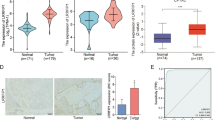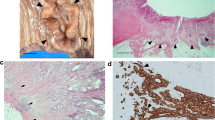Abstract
Previous studies on the expression of Sal-like 4 (SALL4), a zinc finger transcription factor, had conflicting results in colorectal cancer (CRC). The main aim of this study was to investigate the expression of SALL4 and its relationship with β-catenin in CRC. Immunohistochemistry was performed to examine the expression of SALL4 and β-catenin in a cohort of 149 patients with CRC, 12 with atypical hyperplasia, 25 with benign tumor and 38 with normal tissue. Expression patterns of SALL4 and β-catenin and correlation with clinicopathological features were investigated. The relationship between SALL4 and β-catenin was examined by immunofluorescence and co-immunoprecipitation using CRC cell lines, SW480, SW620, HCT116 and HT29. Immunohistochemical analysis revealed significantly lower expression of SALL4 in CRC (46.3 %) than atypical hyperplasia (68.0 %, p < 0.05) and normal tissue (78.9 %, p < 0.01). Well-differentiated CRC seemed to express more SALL4 (47.6 %) than moderately (45.8 %) and poorly-differentiated cancers (18.8 %) (p < 0.05). However, SALL4 expression positively correlated with lymph node metastasis and tumor-node-metastasis (TNM) and Dukes stages (all p < 0.05) suggesting a new mechanism involved in the function of SALL4 in CRC. β-catenin was expressed significantly higher in CRC (69.1 %) than normal tissue (21.1 %, p < 0.01), and positively correlated with CA19-9 level in serum (p < 0.05). SALL4 and β-catenin were positively correlated in CRC (Spearman correlation coefficient R = 0.536, p < 0.01). The group of co-expression of the two molecules showed advanced lymph node metastasis, TNM stage and Dukes stage (all p < 0.05). Double-labeling immunofluorescence and co-immunoprecipitation indicated that SALL4 and β-catenin co-localized in the nucleus and cytoplasm and interacted. Taken together, our results revealed that SALL4 and β-catenin were positively correlated in CRC. In CRC cells, SALL4 and β-catenin co-localized and interacted. The function of SALL4 in promoting lymph node metastasis and advanced clinical stage might partly be due to the interaction with β-catenin.






Similar content being viewed by others
References
Cao D, Humphrey PA, Allan RW (2009) SALL4 is a novel sensitive and specific marker for metastatic germ cell tumors, with particular utility in detection of metastatic yolk sac tumors. Cancer 115:2640–2651. doi:10.1002/cncr.24308
Chai L (2011) The role of HSAL (SALL) genes in proliferation and differentiation in normal hematopoiesis and leukemogenesis. Transfusion 51:87S–93S. doi:10.1111/j.1537-2995.2011.03371.x
Dai X, Ge J, Wang X, Qian X, Zhang C, Li X (2013) OCT4 regulates epithelial-mesenchymal transition and its knockdown inhibits colorectal cancer cell migration and invasion. Oncol Rep 29:155–160. doi:10.3892/or.2012.2086
Doucas H, Garcea G, Neal CP, Manson MM, Berry DP (2005) Changes in the Wnt signalling pathway in gastrointestinal cancers and their prognostic significance. Eur J Cancer 41:365–379. doi:10.1016/j.ejca.2004.11.005
Forghanifard MM, Moghbeli M, Raeisossadati R, Tavassoli A, Mallak AJ, Boroumand-Noughabi S, Abbaszadegan MR (2013) Role of SALL4 in the progression and metastasis of colorectal cancer. J Biomed Sci 20:6–12. doi:10.1186/1423-0127-20-6
Forghanifard MM, Khales SA, Javdani-Mallak A, Rad A, Farshchian M, Abbaszadegan MR (2014) Stemness state regulators SALL4 and SOX2 are involved in progression and invasiveness of esophageal squamous cell carcinoma. Med Oncol 31:922–929. doi:10.1007/s12032-014-0922-7
Habano W, Sugai T, Jiao YF, Nakamura S (2007) Novel approach for detecting global epigenetic alterations associated with tumor cell aneuploidy. Int J Cancer 121:1487–1493. doi:10.1002/ijc.22847
Ikeda H et al (2012) alpha-Fetoprotein-producing gastric carcinoma and combined hepatocellular and cholangiocarcinoma show similar morphology but different histogenesis with respect to SALL4 expression. Hum Pathol 43:1955–1963. doi:10.1016/j.humpath.2011.11.022
Jeong HW et al (2011) SALL4, a stem cell factor, affects the side population by regulation of the ATP-binding cassette drug transport genes. PLoS One 6:e18372. doi:10.1371/journal.pone.0018372
Kobayashi D, Kuribayashi K, Tanaka M, Watanabe N (2011a) Overexpression of SALL4 in lung cancer and its importance in cell proliferation. Oncol Rep 26:965–970. doi:10.3892/or.2011.1374
Kobayashi D, Kuribayshi K, Tanaka M, Watanabe N (2011b) SALL4 is essential for cancer cell proliferation and is overexpressed at early clinical stages in breast cancer. Int J Oncol 38:933–939. doi:10.3892/ijo.2011.929
Li A et al (2013) SALL4 is a new target in endometrial cancer. Oncogene 34:63–72. doi:10.1038/onc.2013.529
Ma Y et al (2006) SALL4, a novel oncogene, is constitutively expressed in human acute myeloid leukemia (AML) and induces AML in transgenic mice. Blood 108:2726–2735. doi:10.1182/blood-2006-02-001594
Maruyama K, Ochiai A, Akimotoa S, Nakamur S, Babab S, Moriyac Y, Hirohashia S (2000) Cytoplasmic beta-catenin accumulation as a predictor of hematogenous metastasis in human colorectal cancer. Oncology 59:302–309
Oikawa T et al (2013) Sal-like protein 4 (SALL4), a stem cell biomarker in liver cancers. Hepatology 57:1469–1483. doi:10.1002/hep.26159
Otsubo T, Akiyama Y, Yanagihara K, Yuasa Y (2008) SOX2 is frequently downregulated in gastric cancers and inhibits cell growth through cell-cycle arrest and apoptosis. Br J Cancer 98:824–831. doi:10.1038/sj.bjc.6604193
Ouakrim DA et al (2015) Trends in colorectal cancer mortality in Europe: retrospective analysis of the WHO mortality database. BMJ 351:h4970. doi:10.1136/bmj.h4970
Paradisi I, Arias S (2007) IVIC syndrome is caused by a c.2607delA mutation in the SALL4 locus. Am J Med Genet A 143A:326–332. doi:10.1002/ajmg.a.31603
Peng L, Tu P, Wang X, Shi S, Zhou X, Wang J (2014) Loss of EphB6 protein expression in human colorectal cancer correlates with poor prognosis. J Mol Histol 45:555–563. doi:10.1007/s10735-014-9577-0
Rao S, Zhen S, Roumiantsev S, McDonald LT, Yuan GC, Orkin SH (2010) Differential roles of SALL4 isoforms in embryonic stem cell pluripotency. Mol Cell Biol 30:5364–5380. doi:10.1128/mcb.00419-10
Ricci-Vitiani L, Lombardi DG, Pilozzi E, Biffoni M, Todaro M, Peschle C, De Maria R (2007) Identification and expansion of human colon-cancer-initiating cells. Nature 445:111–115. doi:10.1038/nature05384
Sakaki-Yumoto M et al (2006) The murine homolog of SALL4, a causative gene in Okihiro syndrome, is essential for embryonic stem cell proliferation, and cooperates with SALL1 in anorectal, heart, brain and kidney development. Development 133:3005–3013. doi:10.1242/dev.02457
Siegel R, Desantis C, Jemal A (2014) Colorectal cancer statistics, 2014. CA Cancer J Clin 64:104–117. doi:10.3322/caac.21220
Sweetman D, Munsterberg A (2006) The vertebrate spalt genes in development and disease. Dev Biol 293:285–293. doi:10.1016/j.ydbio.2006.02.009
Valenta T, Hausmann G, Basler K (2012) The many faces and functions of beta-catenin. EMBO J 31:2714–2736. doi:10.1038/emboj.2012.150
Wang B, Li L, Xie X, Wang J, Yan J, Mu Y, Ma X (2010) Genetic variation of SAL-Like 4 (SALL4) in ventricular septal defect. Int J Cardiol 145:224–226. doi:10.1016/j.ijcard.2009.05.067
Wolpin BM, Mayer RJ (2008) Systemic treatment of colorectal cancer. Gastroenterology 134:1296–1310. doi:10.1053/j.gastro.2008.02.098
Xiong J et al (2015) Stemness factor SALL4 is required for DNA damage response in embryonic stem cells. J Cell Biol 208:513–520. doi:10.1083/jcb.201408106
Yang J et al (2008) Genome-wide analysis reveals SALL4 to be a major regulator of pluripotency in murine-embryonic stem cells. Proc Natl Acad Sci USA 105:19756–19761. doi:10.1073/pnas.0809321105
Yong KJ, Chai L, Tenen DG (2013) Oncofetal gene SALL4 in aggressive hepatocellular carcinoma. N Engl J Med 369:1171–1172. doi:10.1056/NEJMc1308785
Zhang L et al (2014a) SALL4, a novel marker for human gastric carcinogenesis and metastasis. Oncogene 33:5491–5500. doi:10.1038/onc.2013.495
Zhang P et al (2014b) Regulation of induced pluripotent stem (iPS) cell induction by Wnt/β-catenin signaling. J Biol Chem 289:9221–9232. doi:10.1074/jbc.M113.542845
Funding
This study was supported by a grant from the Science and Technology Program of Shenyang City (No. F12-277-1-52).
Author information
Authors and Affiliations
Corresponding author
Ethics declarations
Conflict of interest
The authors declare no conflict of interest.
Rights and permissions
About this article
Cite this article
Hao, L., Zhao, Y., Wang, Z. et al. Expression and clinical significance of SALL4 and β-catenin in colorectal cancer. J Mol Hist 47, 117–128 (2016). https://doi.org/10.1007/s10735-016-9656-5
Received:
Accepted:
Published:
Issue Date:
DOI: https://doi.org/10.1007/s10735-016-9656-5




